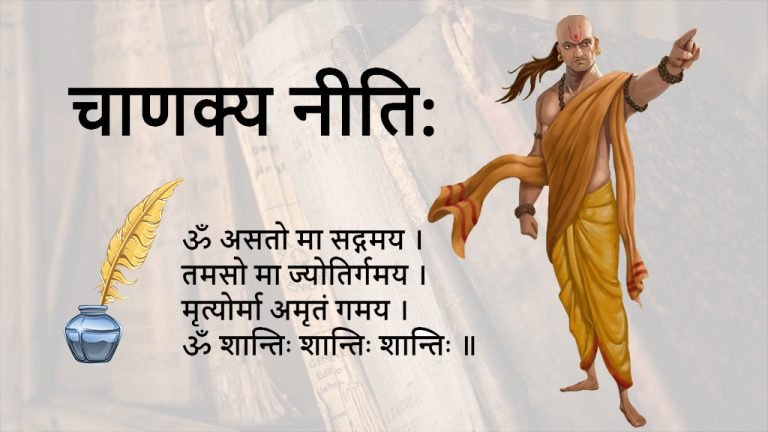Chanakya is considered the pioneer of the field of Political science and economics in India, and his work is thought of as an important precursor to classical economics. Chanakya the Great Economist was an ancient Indian polymath who was active as a teacher, author, strategist, philosopher, economist, jurist and royal advisor. He is traditionally identified as Kauṭilya or Vishnugupta, who authored the ancient Indian political treatise, the Arthashastra, a text dated to roughly between the fourth century BCE and the third century CE. The Arthashastra continued to exert considerable influence after the reign of Ashoka but then disappeared and was considered lost until it was discovered in 1905 CE by the Sanskrit scholar Rudrapatna Shamasastry (l. 1868-1944 CE). Rudrapatna Shamasastry published the work in 1909 CE and then translated it into English and published that version in 1915 CE which brought it greater attention.
Chanakya’s Arthashastra which is very famous by the name of Niti Shastra, describes 17 chapters and 342 sutras written in it. For details visit our site https://digitalksp.com/category/education/.
Chanakya NITI – 14th Chapter – in English
- Poverty, disease, sorrow, imprisonment and other evils are the fruits borne by the tree of one’s own sins.
- Wealth, a friend, a wife, and a kingdom may be regained; but this body when lost may never be acquired again.
- The enemy can be overcome by the union of large numbers, just as grass through its collectiveness wards off erosion caused by heavy rainfall.
- Oil on water, a secret communicated to a base man, a gift given to a worthy receiver, and scriptural instruction given to an intelligent man spread out by virtue of their nature.
- If men should always retain the state of mind they experience when hearing religious instruction, when present at a crematorium ground, and when in sickness — then who could not attain liberation.
- One develops a version of the temporal world by listening to the sacred tells, in the crematorium by viewing the diseased person. Thus if one remains averse to worldly considerations, he is bound to be free from all the bondage.
- One repents after committing a sin but if one gets such wisdom before committing it, one’s progress can not be stopped. So one should act after much deliberation.
- If a man should feel before, as he feels after, repentance — then who would not attain perfection?
- We should not feel pride in our charity, austerity, valour, scriptural knowledge, modesty and morality for the world is full of the rarest gems, which can be seen.
- He who is inside of one’s heart is not far away despite being at a long distance. He who is not in one’s heart is very far away despite being very close. Physical closeness does not show one’s nearness.
- Speak sweet before someone,from whom you expect a favour. When a hU(1ter spots a deer he sings a sweet song before killing it.
- It is ruinous to be familiar with the king, fire, the religious preceptor,and a woman. To be altogether indifferent to them is to be deprived of the opportunity to benefit ourselves, hence our association with them must be from a safe distance.
- Staying close to the king, fire, the teacher and woman give disastrous results but staying far away from them does not give any good result. So one must choose the middle position that is not very far off or very near to them.
- Fire, water, woman, snake, fool and the members of the royal family to be dealt with very carefully because all these six are very dangerous and may take life at any time.
- Only those survive who are virtous, only those live who are strict in their religion. Those who are devoid of virtues and faith in religion make their lives meaningless.
- If you want to put the entire world under your control by just one act, then put restraint upon your tongue speaking ill to the others.
- If you wish to gain control of the world by the performance of a single deed, then keep the following fifteen, which are prone to wander here and there, from getting the upper hand of you: the five sense objects (objects of sight, sound, smell, taste, and touch); the five sense organs (ears, eyes, nose, tongue and skin) and organs of activity (hands, legs, mouth, genitals and anus).
- One who talks according to reference, knows how to influence people and express his love or anger according to his capacity, is a scholar.
- A body of a woman can be viewed differently by three different persons. For a lecher it is a good source of his sexual gratification, for a yogi it is a filthy foul smelling body and for a dog it is a delicious meat. It can be said that beauty lies in the eyes of the beholder.
- A wise man should not divulge the formula of a medicine which he has well prepared; an act of charity which he has performed; domestic conflicts; private affairs with his wife; poorly prepared food he may have been offered; or slang he may have heard.
- A wise man must keep his secret up to himself, about the effective medicines, about his religion, short comings of his house hold, his sexual contact, the rotten food consumed and bad and evil things seen or heard by him otherwise he will be in trouble.
- A Cuckoo keeps silent till the day he gets his voice sweet. It means that a man should not disclose his ability till he becomes perfect.
- One must go on accumulating religious merit, money, eatables, the teachings and medicines otherwise he can not survive the hard days.
- One must not keep the company of the wicked, seek association of the noble and must keep on doing good deeds without forgetting the Almighty even for a moment.






